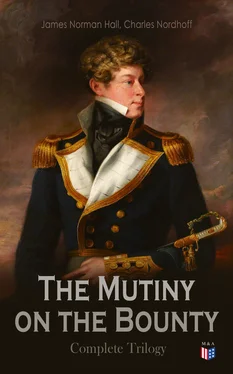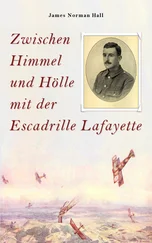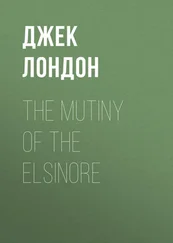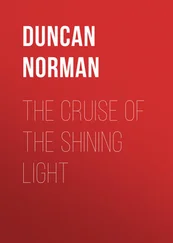It was getting on toward eight o’clock when the launch had been cast off. Shortly afterward the breeze, from the northeast, freshened, and the Bounty gathered way quietly, slipping through the water with a slight hiss of foam. The launch became a mere speck, seen momentarily as she rose to the swell or as the sunlight flashed from her oars. Within half an hour she had vanished as though swallowed up by the sea. Our course was west-northwest.
Table of Contents
Our company was divided, and, though linked together by a common disaster, we were not to share a common fate. I doubt whether a ship has ever sailed from England whose numbers, during the course of her voyage, were to be so widely scattered over the face of the earth, and whose individual members were to meet ends so strange and, in many cases, so tragic.
There had gone with Bligh, in the launch:—
| John Fryer, Master |
| Thomas Ledward, Acting Surgeon |
| David Nelson, Botanist |
| William Peckover, Gunner |
| William Cole, Boatswain |
| William Elphinstone, Master’s Mate |
| William Purcell, Carpenter |
|
|
| Thomas Hayward |
} |
| John Hallet |
} Midshipmen |
| Robert Tinkler |
} |
|
|
| John Norton |
} |
| Peter Lenkletter |
} Quartermasters |
|
|
| George Simpson, Quartermaster’s Mate |
| Lawrence Lebogue, Sailmaker |
| Mr. Samuel, Clerk |
| Robert Lamb, Butcher |
|
|
| John Smith |
} |
| Thomas Hall |
} Cooks |
Of those who remained in the Bounty, the following had taken an active part in the mutiny:—
| Fletcher Christian, Acting Lieutenant |
| John Mills, Gunner’s Mate |
| Charles Churchill, Master-at-Arms |
| William Brown, Gardener |
|
|
| Thomas Burkitt |
} |
| Matthew Quintal |
} |
| John Sumner |
} |
| John Millward |
} |
| William McCoy |
} |
| Henry Hillbrandt |
} Able Seamen |
| Alexander Smith |
} |
| John Williams |
} |
| Thomas Ellison |
} |
| Isaac Martin |
} |
| Richard Skinner |
} |
| Matthew Thompson |
} |
Those in the Bounty with, but not of, Christian’s party, were:—
| Edward Young |
} |
| George Stewart |
} Midshipmen |
|
|
| James Morrison, Boatswain’s Mate |
| Joseph Coleman, Armourer |
| Charles Norman, Carpenter’s Mate |
| Thomas McIntosh, Carpenter’s Crew |
| William Muspratt, Able Seaman |
Also Michael Byrne, the half-blind seaman, and myself. William Muspratt had, for a moment, pretended to be of the mutineers’ party and had accepted a musket offered to him by Churchill. He had overheard Fryer say that he hoped to form a party to retake the vessel, and I am certain he had taken the musket for no other reason than to assist Fryer. When he saw that the matter was hopeless, he immediately laid aside his arms. Coleman, Norman, and McIntosh had been prevented from going in the launch because the mutineers had need of their services as artificers. Smiths and carpenters can no more be dispensed with on a ship at sea than can seamen themselves.
It was but natural that those who had taken no part in the mutiny should be looked upon with suspicion by those who had. Most of the seamen, however, showed no active hostility against us. Churchill ordered us to remain on deck, but forward of the mizzenmast, and there we awaited Christian’s pleasure. Burkitt, who had been deprived of his musket and placed under arms, lest he should shoot Captain Bligh, was again set at liberty. He and Thompson now began baiting and jeering at us, and McCoy and John Williams joined with them. For a moment it seemed likely that there would be a pitched battle between us, and there is no doubt that the non-mutineers would have had the worst of it. Fortunately for us, Christian soon restored order. He came forward, his eyes blazing with anger.
“Get about your work, Thompson,” he ordered. “Burkitt, if I have any more trouble from you, I put you in irons and keep you there!”
“That’s how it is to be, is it?” Thompson replied. “Well, we won’t have it, Mr. Christian. We ain’t mutinied to have you come the Captain Bligh over us!”
“No, by God, we haven’t!” Martin added; “and that you’ll find!”
Christian looked at them for a moment without speaking, and there was that in his eyes to relieve any apprehensions one might have had as to his ability to cope with the situation. The four turbulent men dropped their glances sullenly. Several of the seamen were standing by, Alexander Smith among them. “Order all hands aft, Smith,” said Christian. He returned to the quarter-deck and paced up and down while the men collected. Then he turned and faced them.
“There is one matter we will decide once for all,” he began, quietly, “and that is who is to be captain of this ship. I have taken her with your help, in order to be rid of a tyrant who has made life a burden to all of us. Make no mistake about our status from this time on. We are mutineers, and if we should be discovered and taken by one of His Majesty’s vessels, not a man of us but will suffer death. That possibility is not so remote as some of you may think. Should Mr. Bligh succeed in reaching England, immediately upon his arrival there a ship of war will be sent in search of us. Should the Bounty not be reported in a year’s time, or, at the latest, two years, a ship will be sent, nevertheless, to discover, if possible, the reason for her disappearance. Bear this in mind, all of you. We are not only mutineers but pirates as well, for we have run away with one of His Majesty’s armed vessels. We are cut off from England forever, except as prisoners whose fate, if taken home, is certain.
“The Pacific is wide, and still so little known that we need never be taken except as the result of our own folly. In our situation a leader is essential, one whose will is to be obeyed without question. It should be needless to tell British seamen that no ship, whether manned by mutineers or not, can be handled without discipline. If I am to command the Bounty I mean to be obeyed. There shall be no injustice here. I shall punish no man without good cause, but I will have no man question my authority.
“I am willing that you shall decide who is to command the Bounty. If there is some man most of you prefer in my place, name him, and I will resign my authority. If you wish me to lead you, mind what I have said. I mean to be obeyed.”
Churchill was the first to speak. “Well, men, what have you to say?”
“I’m for Mr. Christian!” Smith called out.
There was an immediate hearty agreement with Smith on the part of all the mutineers with the exception of Thompson and Martin; but when Christian called for a show of hands, even these two raised theirs with the others.
“We have another matter to decide,” Christian went on. “There are a number of men with us who took no part in seizing the vessel. They would have gone with Mr. Bligh had opportunity permitted....”
“Put ’em in irons, sir,” Mills called out. “They’ll do us a mischief if they can.”
“On this ship, there shall be no putting of anyone in irons without good cause,” Christian replied. “These men are not to be blamed for taking no part with us. They decided as seemed best to them, and I respect their decisions; but I shall know how to act if they show toward us any sign of treachery. It is for them to decide now what their treatment with us shall be.”
Читать дальше











